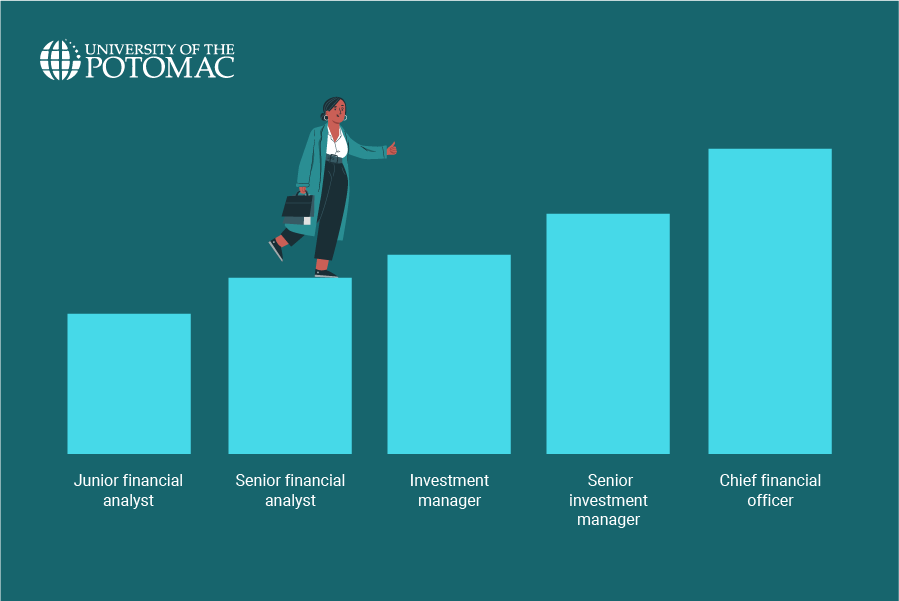An MBA in finance opens many career opportunities to become a financial analyst, credit manager, and portfolio compliance specialist, among others. Follow along and learn how an MBA in finance can shape your future.
In any type of company, regardless of its size or industry, financial planning and management are necessary for success. This has led to the finance sector being in high demand across diverse industries, with BLS projecting faster-than-average employment growth for all business and financial occupations over the decade. So, this may be the perfect time to brush up on your knowledge and skills and pursue further education in the field.
If you want to specialize in finance and management, a Master of Business Administration (MBA) in finance might be ideal. But what exactly can you do with an MBA in finance?
That’s why today we will explore seven excellent career paths available after earning an MBA in finance, including your earning potential, and how to decide if this credential is right for you.
What Is a Typical Career Path With an MBA in Finance?

The finance industry is vast in the job positions it offers. For example, if you are just starting, you can get roles such as:
- Financial Analyst
- Investment Banking Analyst
- Corporate Finance Analyst
- Audit Associate
- Credit Analyst
Upon gaining some experience in these roles and completing an MBA in finance, professionals can jump into more advanced roles:
- Senior Financial Analyst, which, after some years of experience, can become a Vice President in Finance or Chief Financial Officer
- Investment Banking Associate, which through the years, can progress into Director of Finance or reach an executive role such as Managing Director in Investment Banking
- Corporate Finance Manager with years in the job allowing you to become Senior Portfolio Manager or top the ladder as Chief Investment Officer
- Consultant (Finance or Strategy), which after some years can lead to a role as a Head of Corporate Development or Partner in Consulting Firms
The progress in the roles above is highly utilized from an MBA in Finance as such a graduate degree helps you develop strong finance-related specialized skills and knowledge, advances your leadership capacities, and helps you build an extensive network of peers and professionals.
Top Careers You Can Pursue With an MBA in Finance
An MBA in finance can equip you with advanced business knowledge, real-world abilities, and a comprehensive knowledge of finance principles. This prestigious degree can lead to numerous high-profile, high-paying positions, from entry-level management to C-suite positions. Let’s explore the top careers you can pursue with an MBA in finance.
Chief Financial Officer

Like many young financial professionals, you may dream of joining the C-suite. But with great power comes great responsibility. As a CFO, you’ll be in charge of making decisions that impact the financial strategy of entire companies. You’ll lead and direct an entire organization’s finance and accounting teams while advising other C-suite executives regarding financial decisions.
Furthermore, you’ll review and approve contracts and financial reports, capital expenditures, and budgets from various departments.
Given the range of duties, as a CFO, you must possess extensive experience in leadership positions through which you extensively practiced skills such as leadership, strategic thinking, analytical aptitude, and risk assessment.
Credit Manager
Are you looking for a research role in finance? The credit manager role can offer you that, as you research clients’ creditworthiness through your day-to-day practices.
Your role as a credit manager is to maximize corporate sales while minimizing bad debt by adhering to credit policy. You’ll be responsible for creating credit score models that predict risks and basing the results on potential profits, losses, and credibility. You’ll also get to update, review, and develop credit policies.
To perform these tasks, you must possess skills such as analytical ability and knowledge of credit laws.
Financial Analyst
Becoming a financial analyst may suit you if you enjoy digging into financial data and using the results to make informed business decisions. As a financial analyst, you’ll evaluate financial data and trends to facilitate finance and operations personnel decision-making. You’ll also forecast future business opportunities to help sales teams and product developers.
To perform such duties, you need to possess strong analytical skills, and a good grasp of financial modeling, forecasting and planning, and assessing investment opportunities.
Due to your role in determining how finances impact the organization’s operations, the role opens doors to numerous industries, including insurance companies, pension funds, banks, investment companies, real estate, government and nonprofits.
Financial Manager
An advanced role you can pursue as an MBA in finance graduate is that of a financial manager. As a financial manager, you’ll help organizations implement and manage financial goals, oversee budgets, and distribute financial resources. Moreover, you’ll evaluate data, prepare financial reports, reduce financial risk, and advise businesses on financial decisions.
In your work, you must have strong strategic planning and decision-making skills. These skills allow you to create strategies and make informed decisions in line with the company’s long-term goals.
Becoming a financial manager offers a clear path to career growth, as the role can be a stepping stone toward becoming a Financial Director or CFO.
Investment Manager
If financial markets are your cup of tea, then the role of investment manager is what you should aim for. In this role, you will oversee the construction and management of investment portfolios, selecting assets (stocks, bonds, mutual funds, etc.) that align with the client’s investment goals, risk tolerance, and time horizon. You’ll also be responsible for managing trading activities to generate profits and implement fund investment strategies.
To be a successful investment manager, you need under your belt an array of skills, including:
- Understanding market trends
- Strong analytical skills
- Risk management
- Financial modeling and valuation
- Strong interpersonal and communication skills
While it depends largely on the institution you work for, this role allows you to work with various types of clients, from individuals to large institutions.
Portfolio Compliance Specialist
Becoming a portfolio compliance specialist is another excellent career option as an MBA in finance graduate. In this role, you’ll ensure an organization’s regulatory compliance, which means you will spend most of your days analyzing account transactions and portfolio holdings for risk and resolving any violations.
They say the devil is in the details, and this saying applies especially to portfolio compliance specialists. You need to possess a strong attention to detail as you are responsible for preventing regulatory breaches and ensuring accuracy. Also, you need to possess extensive knowledge of compliance regulations through which you can navigate complex regulatory landscapes and implement effective compliance programs.
Wealth Management Consultant
If you’re interested in advising clients on wealth accumulation, becoming a wealth management consultant can be ideal for you.
Interested in pursuing a degree?
Fill out the form and get all admission information you need regarding your chosen program.
This will only take a moment.
Message Received!
Thank you for reaching out to us. We will review your message and get right back to you within 24 hours.
If there is an urgent matter and you need to speak to someone immediately you can call at the following phone number:
- We value your privacy.
As a wealth management consultant, you’ll examine current portfolios and deliver a comprehensive strategy that considers all aspects of your client’s finances. Serving as trusted advisors on your client’s objectives and financial profiles, you can build long-term client relationships.
In your line of work, you must possess skills like assessment management, interpersonal skills, and knowledge of investment strategies.
Salary Expectations for MBA in Finance Graduates
If you’re considering pursuing an MBA in finance, naturally, the next question you’ll ask is, “What do finance jobs pay?”
According to the 2023 Corporate Recruiters Survey by GMAC, the starting salary of MBA graduates is $125,000. However, the compensation you can expect to receive as an MBA graduate varies greatly, depending on factors like job location, experience, and industry. Your salary as an MBA in finance also varies depending on your job title. For example, on a yearly basis, as a:
- CFO, you get $443,306;
- Credit Manager, you get $118,900;
- Financial Analyst, you get $112,950;
- Financial Manager, you get $147,530.
Overall, your compensation as an MBA in finance graduate is often more than just base salary, as these positions come with employment packages that include signing bonuses, stock options, performance bonuses, and other in-kind benefits.
Is an MBA in Finance the Right Choice for You?
Taking on a graduate program such as an MBA in finance is a significant investment. Therefore, before embarking on this educational adventure, you must have a clear vision of your future career path. This includes carefully considering your career goals, interests, and financial commitment.
An MBA is a substantial financial investment regardless of your specialization. According to the Education Data Initiative, the average cost of an MBA is $56,850. There’s no way around it—this is a considerable sum.
However, don’t let the high price put you off. With the high salaries that come with a career in finance, you can expect a return on your investment when you graduate. You may also see other long-term benefits like a diverse network and better awareness of the business world.
While earning an MBA in finance is a personal decision, know that the time has never been better to hold such a degree. The market demand is high, with BLS reporting 911,400 openings yearly for business and financial occupations over the decade.
So, whether an MBA in finance is the right choice ultimately depends on your personal and professional objectives. However, it can bridge entry-level and mid-level jobs to more advanced managerial and leadership roles. If you’re in a field where you need a more advanced degree to climb the ladder, an MBA in Finance might be right for you.
Conclusion
Whether you’re interested in running a company or helping set up individuals for financial success, an MBA in finance can put you on the path to career advancement in no time.
To ensure you get the best possible opportunity to do so, enroll in our MBA program with a concentration in finance and increase your chances of pursuing a lucrative career.
Frequently Asked Questions
Which bachelor’s degree is best for an MBA in finance?
The best bachelor’s degrees for an MBA in finance include finance, accounting, business administration, economics, or a related field.
Which job is best after an MBA in finance?
After earning an MBA in finance, the top job options include CFO, credit manager, financial analyst, financial manager, investment manager, and more.
Which are the highest-paying jobs in MBA finance?
The highest-paying jobs with an MBA in finance include CFO, with a salary of $443,306; investment manager, with a salary of $178,671; and financial manager, with a salary of $174,820.
Is an MBA good for a career in finance?
An MBA can be a worthwhile investment for a career in finance. It opens doors to high-paying jobs, provides transferable skills like leadership and communication, and allows you to network with highly skilled and ambitiously minded individuals.










